On October 12, 2020, Prof. Asif Siddiqi published, “Transcending Gravity: The View from Postcolonial Dhaka to Colonies in Space,” in The Los Angeles Review of Books.

You can follow Prof. Asif Siddiqi on Twitter @historyasif.
On October 12, 2020, Prof. Asif Siddiqi published, “Transcending Gravity: The View from Postcolonial Dhaka to Colonies in Space,” in The Los Angeles Review of Books.

You can follow Prof. Asif Siddiqi on Twitter @historyasif.
Comments Off on Prof. Asif Siddiqi Publishes Book Review, “Transcending Gravity: The View from Postcolonial Dhaka to Colonies in Space,” in the Los Angeles Review of Books.
Filed under Faculty Profiles, Faculty Profiles, Publications
In the sixteenth century, Andean communities were forcibly removed from their villages by Spanish colonizers and resettled in planned, self-governed towns. Rather than conforming to Spanish cultural and political norms, indigenous Andeans adopted and gradually refashioned the institutions imposed on them, in the process producing a new kind of civil society that merged their traditional understanding of collective life with the Spanish notion of the común to demand participatory democracy. This hybrid concept of self-rule spurred the indigenous rebellions that erupted across Latin America against Spanish rulers and native hereditary nobility. Through the letters and documents of the Andean people themselves, The People Are King examines the community-based democracy that played a central role in the Age of Atlantic Revolutions and continues to galvanize indigenous movements in Bolivia today.
“Elizabeth Penry offers a sharply original account of the Andean Age of Rebellions, placing it in a culture of civic populism whose roots extended to both pre-conquest Peru and medieval Spain. Where previous narratives have gravitated toward charismatic leaders, The People are King breathes a democratic spirit that is both moving and persuasive.”—Jeremy Mumford, Brown University
“This meticulously researched and gracefully narrated look at the transformation over time of the public sphere in indigenous communities of highland Bolivia offers readers a remarkable window into how and why the Great Rebellion of the 1780s unfolded by focusing on communities instead of on the leadership. This is an unusual and exciting second look at the prelude to independence in Spanish America.”—Joanne Rappaport, Georgetown University
“Elizabeth Penry’s skillfully crafted study reconstructs the ways colonial Andean comunes or commons became grassroots laboratories where modern ideas of communal self-government and popular sovereignty gradually emerged. Inscribed in the best traditions of Andean history and ethnohistory, The People are King is a much-needed contribution to the intricate ways indigenous community politics helped establish the foundations of the modern world.”— José Carlos de la Puente, author of Andean Cosmopolitans: Seeking Justice and Reward at the Spanish Royal Court
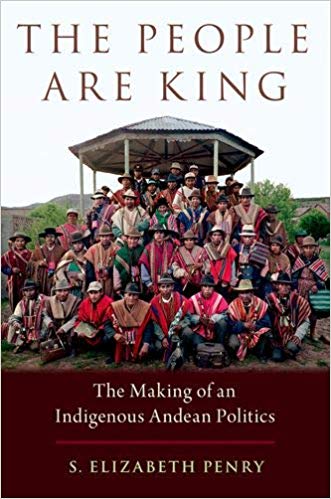
You can purchase the book here

Comments Off on Prof. S. Elizabeth Penry’s New Book, “The People Are King: The Making of an Indigenous Andean Politics (Oxford University Press),” is Now Out!
Filed under Faculty News, Publications, This week in Fordham History
We are excited to announce just some of the fascinating activities members of the Fordham History Department have engaged in these last few weeks:
Prof. Rosemary Wakeman just edited and contributed an article to a special issue on “Shanghai: Heritage at the Crossroads of Culture” for the journal Built Heritage. The journal is published by the College of Architecture and Urban Planning at Tongji University in Shanghai. Her article on “Mid-Century Urban Avant-Gardes” compares Art Deco architecture in Shanghai and New York.
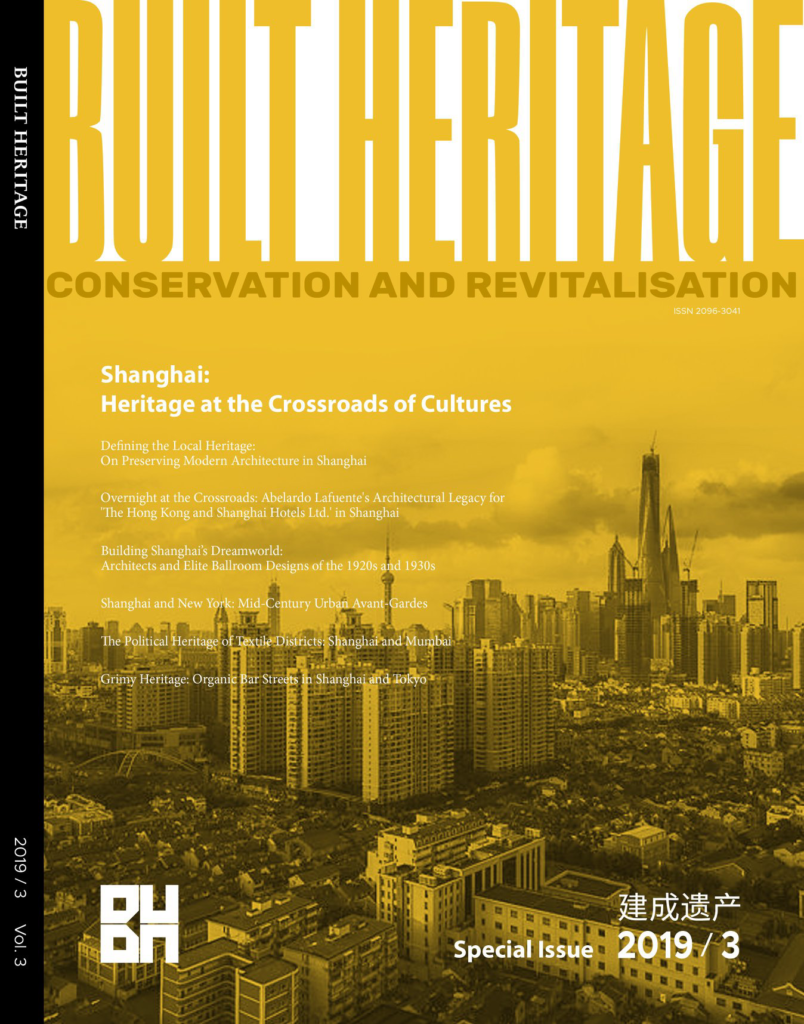
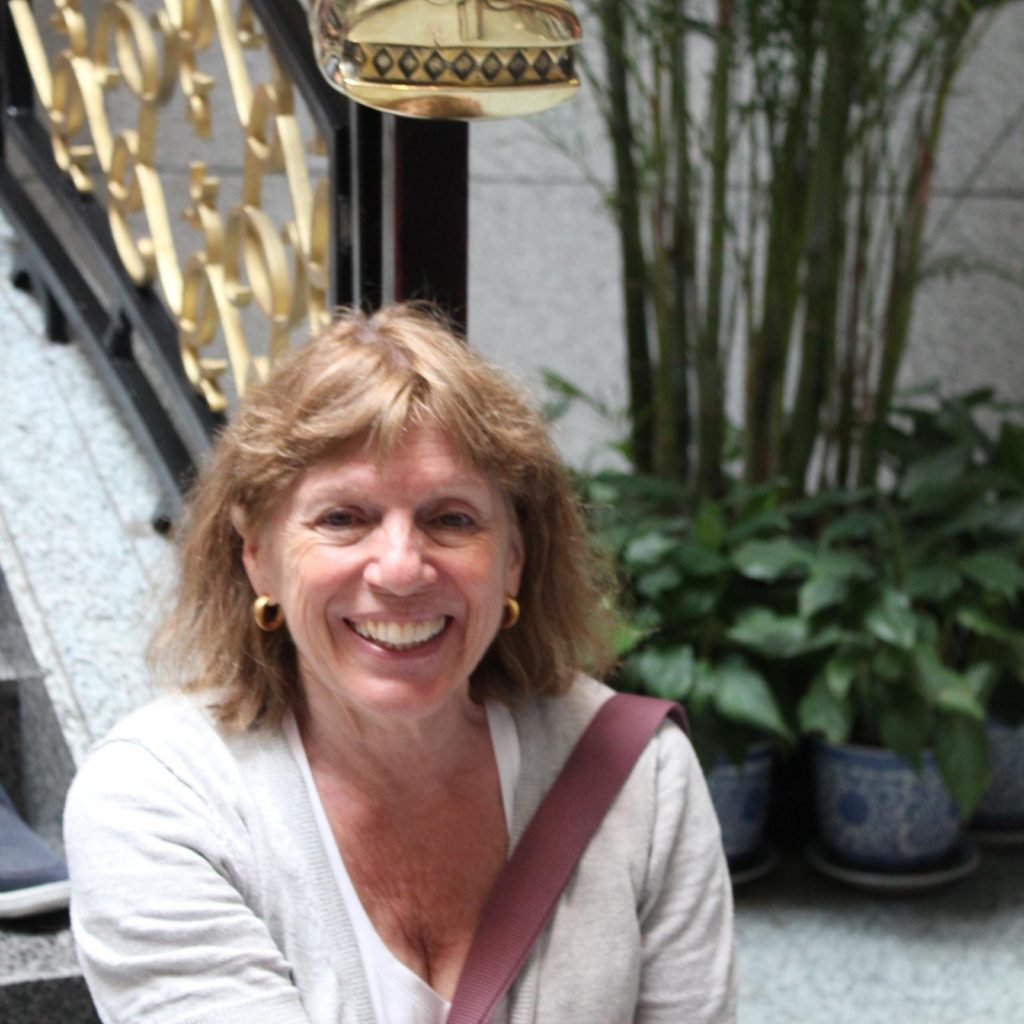
Prof. Chris Dietrich just published a timely and thought-provoking piece in today’s Washington Post!” https://www.washingtonpost.com/outlook/2019/09/27/how-war-forced-united-states-rethink-politics-oil/
You can follow Prof. Chris Dietrich on Twitter @CRWDietrich
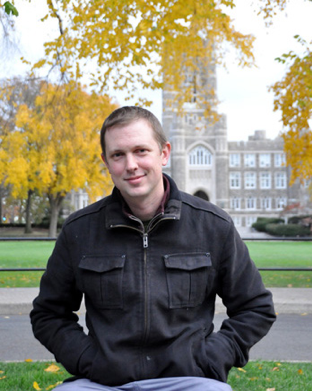
Prof. Amanda Armstrong-Price gave a fascinating presentation at NYU entitled “Strains of Permissiveness, Fields of Force: Governing Intimacies along the Railways of Colonial India.” The talk was hosted by The Postcolonial, Race, and Diaspora Studies Colloquium at NYU. You can find more details of Prof. Armstrong-Price’s talk here: https://www.facebook.com/events/2525672297648631/

Prof. Wes Alcenat recently published a thought-provoking piece, “Freedom Without Citizenship, Reconciliation without Reparations,” on the African American Intellectual Historical Society’s award-winning blog, “Black Perspectives.” https://www.aaihs.org/freedom-without-citizenship-reconciliation-without-reparations/
You can follow Prof. Wes Alcenat on Twitter at @wesalcenat

Comments Off on Week Highlights
Filed under Faculty News, Public History, This week in Fordham History
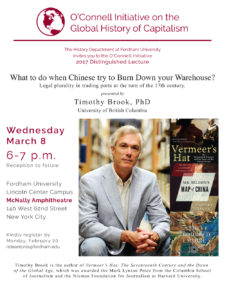 Fordham University was honored to host Professor Timothy Brook this last Wednesday in the McNally Auditorium as part of the O’Connell Initiative on the Global History of Capitalism. Prof. Brook has spent his prolific career studying cultural and social history in Southeast Asia. From the Ming Dynasty in 14th to 17th century China to the Japanese occupation of China during WWII, Dr. Brook has authored numerous monographs, including the acclaimed Vermeer’s Hat: The Seventeenth Century and the Dawn of the Global World (London: Profile Books, 2009) and, most recently, The Troubled Empire: China in the Yuan and Ming Dynasties (Cambridge, MA: Belknap Press of Harvard University Press, 2010).
Fordham University was honored to host Professor Timothy Brook this last Wednesday in the McNally Auditorium as part of the O’Connell Initiative on the Global History of Capitalism. Prof. Brook has spent his prolific career studying cultural and social history in Southeast Asia. From the Ming Dynasty in 14th to 17th century China to the Japanese occupation of China during WWII, Dr. Brook has authored numerous monographs, including the acclaimed Vermeer’s Hat: The Seventeenth Century and the Dawn of the Global World (London: Profile Books, 2009) and, most recently, The Troubled Empire: China in the Yuan and Ming Dynasties (Cambridge, MA: Belknap Press of Harvard University Press, 2010).
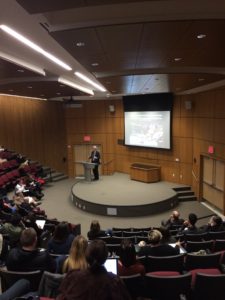 Prof. Brook’s presentation, an ongoing research project titled “What to do when Chinese Try to Burn Down your Warehouse: Legal Plurality in Trading Ports at the Turn of the 17th Century,” was a captivating collection of stories and theories regarding the burgeoning role of capitalism in the Southeast Asian port city of Bantam. Eyebrow-raising title aside, Brook’s pithy and poignant ideas on capitalism gave the gathered crowd much to discuss in the following Q&A. During both the presentation and resulting discussion, Brook maintained that, “capitalism may have emerged in Europe, but only because of Europe’s engagement with the rest of the world.” Brook elaborated his examination of the legal troubles that plagued the Europeans’ imperialist endeavors through four stories culled from the diary of the early 17th century English trader Edmund Scott. Such legal troubles may have hampered immediate European imperialism in each specific case, but they may have also formed a framework by which the European powers could then apply when trading with other plundered nations. Such legal cases after all gave rise to Huig de Groot’s Mare Liberum and the ensuing legal debate on the law of the seas.
Prof. Brook’s presentation, an ongoing research project titled “What to do when Chinese Try to Burn Down your Warehouse: Legal Plurality in Trading Ports at the Turn of the 17th Century,” was a captivating collection of stories and theories regarding the burgeoning role of capitalism in the Southeast Asian port city of Bantam. Eyebrow-raising title aside, Brook’s pithy and poignant ideas on capitalism gave the gathered crowd much to discuss in the following Q&A. During both the presentation and resulting discussion, Brook maintained that, “capitalism may have emerged in Europe, but only because of Europe’s engagement with the rest of the world.” Brook elaborated his examination of the legal troubles that plagued the Europeans’ imperialist endeavors through four stories culled from the diary of the early 17th century English trader Edmund Scott. Such legal troubles may have hampered immediate European imperialism in each specific case, but they may have also formed a framework by which the European powers could then apply when trading with other plundered nations. Such legal cases after all gave rise to Huig de Groot’s Mare Liberum and the ensuing legal debate on the law of the seas.
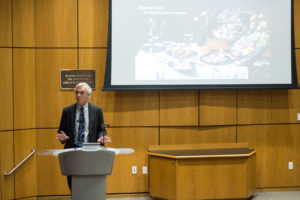 The History Department would like to extend its sincerest thanks to Professor Timothy Brook and the O’Connell Initiative for taking the time to present his insightful and illuminating research.
The History Department would like to extend its sincerest thanks to Professor Timothy Brook and the O’Connell Initiative for taking the time to present his insightful and illuminating research.
For more on Professor Brook’s talk, see here.
Comments Off on Timothy Brook Delivers O’Connell Lecture on Capitalism and the Law of the Sea in 17th Century Java
Filed under Department Events, Events, O'Connell Initiative
On July 2 Professor Silvana Patriarca will be delivering one of two keynote lectures at a conference in Cagliari, Sardinia. The conference, which is sponsored by SISSCO (the Italian Society for Contemporary History), deals with Italy’s colonial inheritance. The title of Patriarca’s talk will be “Dopoguerra in bianco e nero: ‘razza’ e Chiesa cattolica nell’Italia postfascista” (” Postwar in Black and White: ‘Race’ and the Catholic Church in Postfascist Italy”).
Comments Off on Patriarca to Deliver Keynote Address at Cagliari Conference
Filed under Faculty News
In a new article published this month in the American Historical Review, Carina Ray explores the connections between racialized sexual exploitation and anti-colonial nationalism.
Comments Off on Major New Article Explores Race, Sexual Exploitation, and Anti-Colonial Nationalism in Colonial Ghana
Filed under Faculty News